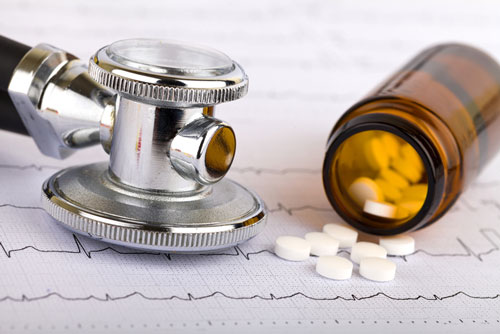Millions of Americans take angiotensin-converting enzyme (ACE) inhibitors to lower their blood pressure.
The drugs include Lotensin (benazepril), Vasotec (enalapril), Prinivil (lisinopril), Altace (ramipril), and Aceon (perindopril).
They work by causing the muscles around blood vessels to relax. This allows them to open wider, reducing hypertension.1
But a new study shows that these medications raise the risk of one of the most feared and deadly diseases in America by nearly a third.
The research was published in the medical journal BMJ. Scientists reviewed data on nearly 1 million patients. All of them had started taking blood pressure meds between 1995 and 2015. Initially, none had cancer. After six years, 8,000 developed lung cancer.2
After taking other factors into account such as smoking, weight, and drinking, the scientists found that taking an ACE inhibitor raised the lung cancer risk by 14%. That was after 5 years. Those who took the drugs for 10 years had a 31% increase.
The scientists suspect that ACE inhibitors ramp up levels of bradykinin and substance P. These chemicals are linked to lung cancer.
If that sounds scary, it is. Even when caught early, only about half of lung cancer patients survive for five years. If the cancer has spread beyond the lungs, the survival rate is 5%.3
5 Natural Alternatives for Lowering Blood Pressure
If you are on an ACE inhibitor, talk to your doctor about taking another medication. And try one or more of these natural blood pressure remedies. You may be able to reduce or even eliminate the hypertension drugs you are taking.
- CoQ10. It’s a naturally occurring enzyme. It contains antioxidants that lower blood pressure. CoQ10 has no known side effects. The Mayo Clinic recommends up to 360 mg daily. It takes about eight to 12 weeks to see a fall in blood pressure.
- Vitamin D. A study published in The Lancet Diabetes & Endocrinology found that the sunshine vitamin reduces blood pressure. And a study at Augusta University in Georgia found that people taking 4,000 IUs of vitamin D daily reduced their arterial stiffness by over 10% within 16 weeks.
- Hibiscus Tea. In a study at Tufts University, participants who drank three cups of a hibiscus tea daily lowered systolic (the upper number) blood pressure by 7 points. That is on par with the effect of prescription medications. The researchers say phytochemicals in hibiscus are responsible. Look for tea blends that list hibiscus near the top of ingredients.
- Dark Chocolate. A Harvard study found that eating a small square of dark chocolate daily helps lower blood pressure. The flavonoids in chocolate cause blood vessels to open wider. Make sure you stick to dark chocolate with at least 60% cacao content.
- Flaxseed. This might be the king of natural blood pressure solutions. Canadian researchers found that subjects who ate 30 grams of flaxseed a day for six months lowered their systolic readings by 15 points on average. Their diastolic readings dropped by 7 points. The researchers found that flaxseed’s high alpha-linolenic acid content caused the drop.
Add flaxseed to a salad, smoothie, or protein shake. Make sure you grind up the seeds. If you don’t, your body won’t absorb the nutrients. A coffee grinder or blender works well.
Editor’s Note: Something strange was happening to pilots training to fly F-16 fighter jets.
The ones who went into the program with elevated blood pressure were coming out a few weeks later with normal, healthy readings. They hadn’t taken any medications. Their diets hadn’t changed. They hadn’t made any changes to their exercise regimens.
Go HERE to discover their secret. And how you could lower your blood pressure up to 15 points from your living room using this same trick.
Related Articles
The Best Exercise to Lower Blood Pressure
Natural Extract May Save Smokers from Lung Cancer
This Food Additive Is Giving You High Blood Pressure
Like this Article? Forward this article here or Share on Facebook.
References:
1 https://www.medicinenet.com/ace_inhibitors/article.htm#what_are_ace_inhibitors_and_how_do_they_work_mechanism_of_action
2 https://consumer.healthday.com/cancer-information-5/lung-cancer-news-100/lung-cancer-risk-tied-to-common-blood-pressure-drug-738929.html
3 https://www.lung.org/lung-health-and-diseases/lung-disease-lookup/lung-cancer/resource-library/lung-cancer-fact-sheet.html

